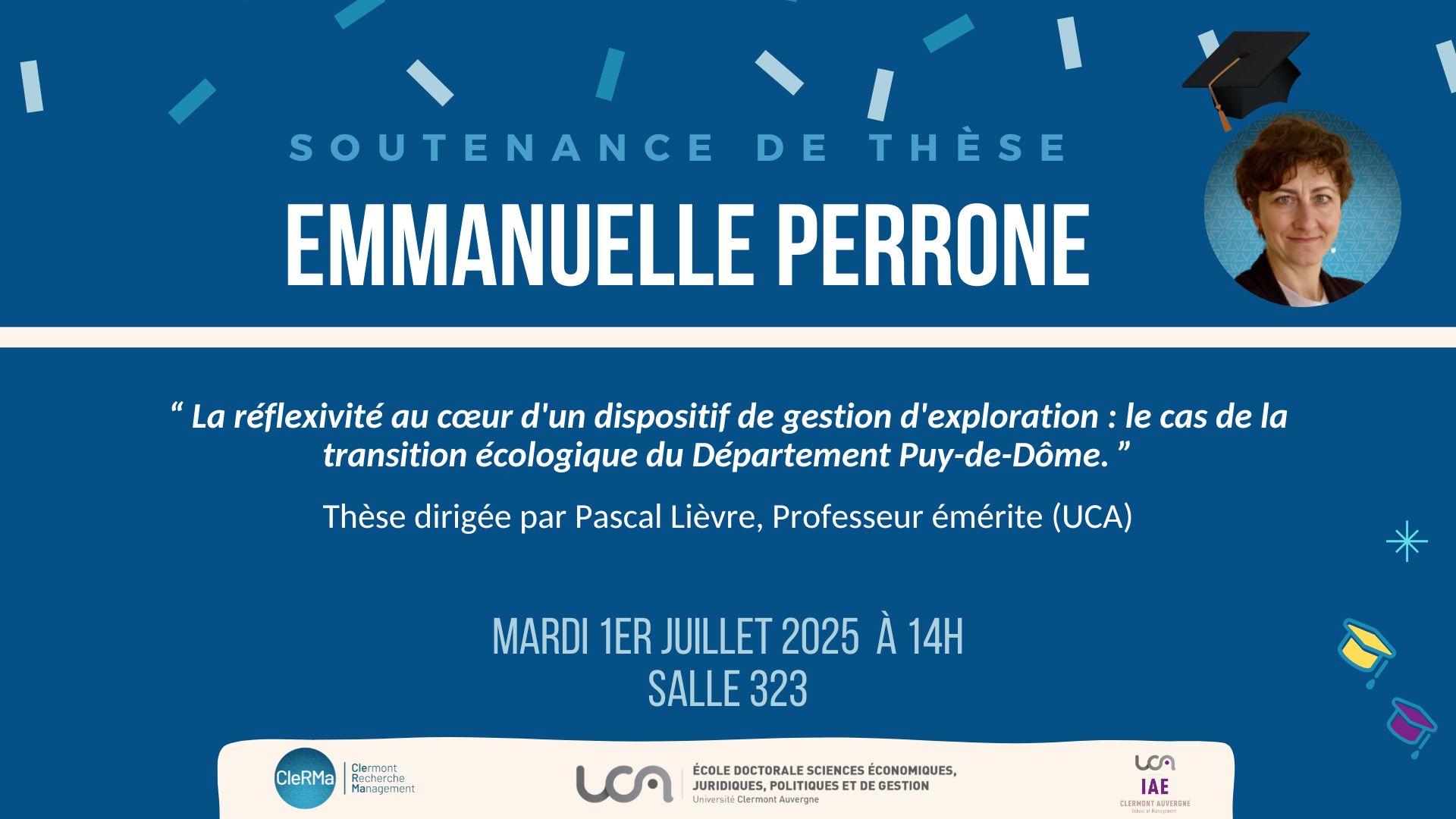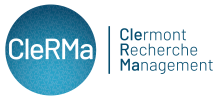Le 1 juil. 2025
Soutenance de thèse d'Emmanuelle, mardi 1 juillet 2025
Publié le 23 juin 2025 – Mis à jour le 23 juin 2025

Complément date
à 14h
Lieu(x)
à l'IAE - Salle 323
Emmanuelle soutiendra sa thèse le mardi 1er juillet à 14h.
Sa thèse s'intitule “La réflexivité au cœur d'un dispositif de gestion d'exploration : le cas de la transition écologique du Département Puy-de-Dôme.”
Composition du jury :
Sous la direction de Pascal Lièvre, Professeur Emérite en sciences de gestion, IAE, CleRMa, UCA.
Rapporteurs :
Nathalie Raulet-Crozet, Professeure en sciences de gestion, IAE Paris – Sorbonne Business School Université Paris 1 Panthéon-Sorbonne.
Christophe Vignon, Maître de conférences (HDR) en sciences de gestion, IAE, Université Rennes 2, CREM UMR CNRS 6211.
Suffragants :
Corinne Rochette, Professeure en sciences de gestion, IAE School of Management, CleRMa, Université Clermont Auvergne.
Patrice Terramorsi, Maître de Conférence (HDR), IAE Corse, LISA UMR CNRS 6240, Université de Corse.
Corinne Rochette, Professeure en sciences de gestion, IAE School of Management, CleRMa, Université Clermont Auvergne.
Patrice Terramorsi, Maître de Conférence (HDR), IAE Corse, LISA UMR CNRS 6240, Université de Corse.
Résumé du projet de thèse : La thèse explore la manière dont la réflexivité joue un rôle clé dans les dispositifs de gestion des transitions écologiques, traitées ici comme des situations de gestion d'exploration. L'étude est fondée sur une recherche-intervention appuyée par la théorie ancrée et s’inscrit dans le cadre du projet de transition écologique du Conseil Départemental du Puy-de-Dôme, débuté en 2019. Le Département vise à devenir un leader dans ce domaine en partenariat avec la Fabrique des Transitions. Face aux défis de complexité et d'incertitude inhérents à ces projets, l'étude met en lumière la transformation des politiques publiques, des relations avec les citoyens et des modes d'organisation.
Sur une période de trois ans, l'étude documente cette transition à travers les dispositifs de gestion, avec un accent particulier sur le vécu des acteurs, leur construction de sens, et leur engagement dans l'action collective. Elle identifie des interactions langagières réflexives qui sont cruciales pour l’apprentissage collectif en situation de gestion exploratoire. L'analyse montre qu'il est nécessaire de développer des dispositifs de gestion capables d’évoluer en fonction de la transition écologique, caractérisée par l’incertitude, les ruptures et les risques.
Le texte se positionne à l’intersection des études sur les transitions durables et de la gestion en situations extrêmes. Il introduit une approche épistémologique constructiviste radicale et se base sur des cadres théoriques traitant de la gestion d'exploration, des dispositifs de gestion, et de la réflexivité pour aborder les tensions contradictoires entre les acteurs et l’incertitude du projet.
L’étude présente également les résultats, organisés en trois volets principaux. Le premier montre l’évolution du dispositif de recherche pour s’adapter aux réalités du terrain. Les autres résultats se concentrent l'un sur l’évolution des dispositifs de gestion, l'autre sur la construction les boucles réflexives et leur rôle dans les dynamiques des dispositifs observées.
Mots-clés de la thèse : Réflexivité, Dispositif de gestion, Exploration/exploitation, Action publique, transition écologique, Recherche-intervention
Résumé du projet de thèse en anglais : The thesis explores how reflexivity plays a key role in the management mechanisms of ecological transitions, treated here as exploratory management situations. The study is based on an intervention-research approach supported by grounded theory and is part of the ecological transition project of the Puy-de-Dôme Department, which began in 2019. The Department aims to become a leader in this field in partnership with the Fabrique des Transitions. Faced with the complexity and uncertainty inherent in such projects, the study highlights the transformation of public policies, relationships with citizens, and organizational structures.
Over a three-year period, the study documents this transition through management mechanisms, with a particular focus on the experiences of the actors, their meaning-making processes, and their engagement in collective action. It identifies reflexive linguistic interactions that are crucial for collective learning in exploratory management situations. The analysis demonstrates the need to develop management mechanisms that can evolve in response to the ecological transition, characterized by uncertainty, disruptions, and risks.
The text positions itself at the intersection of studies on sustainable transitions and management in extreme situations. It introduces a radically constructivist epistemological approach and draws on theoretical frameworks related to exploratory management, management mechanisms, and reflexivity to address the contradictory tensions between actors and the project's uncertainty.
The study also presents the findings, organized into three main sections. The first shows the evolution of the research framework to adapt to the realities on the ground. The other findings focus on the evolution of management mechanisms and the role of reflexive loops in the dynamics of the observed mechanisms.
Mots-clés de la thèse : Reflexivity, Management apparatus, Exploitation/exploration, Public policies,ecological transition, Action research
Sur une période de trois ans, l'étude documente cette transition à travers les dispositifs de gestion, avec un accent particulier sur le vécu des acteurs, leur construction de sens, et leur engagement dans l'action collective. Elle identifie des interactions langagières réflexives qui sont cruciales pour l’apprentissage collectif en situation de gestion exploratoire. L'analyse montre qu'il est nécessaire de développer des dispositifs de gestion capables d’évoluer en fonction de la transition écologique, caractérisée par l’incertitude, les ruptures et les risques.
Le texte se positionne à l’intersection des études sur les transitions durables et de la gestion en situations extrêmes. Il introduit une approche épistémologique constructiviste radicale et se base sur des cadres théoriques traitant de la gestion d'exploration, des dispositifs de gestion, et de la réflexivité pour aborder les tensions contradictoires entre les acteurs et l’incertitude du projet.
L’étude présente également les résultats, organisés en trois volets principaux. Le premier montre l’évolution du dispositif de recherche pour s’adapter aux réalités du terrain. Les autres résultats se concentrent l'un sur l’évolution des dispositifs de gestion, l'autre sur la construction les boucles réflexives et leur rôle dans les dynamiques des dispositifs observées.
Mots-clés de la thèse : Réflexivité, Dispositif de gestion, Exploration/exploitation, Action publique, transition écologique, Recherche-intervention
Résumé du projet de thèse en anglais : The thesis explores how reflexivity plays a key role in the management mechanisms of ecological transitions, treated here as exploratory management situations. The study is based on an intervention-research approach supported by grounded theory and is part of the ecological transition project of the Puy-de-Dôme Department, which began in 2019. The Department aims to become a leader in this field in partnership with the Fabrique des Transitions. Faced with the complexity and uncertainty inherent in such projects, the study highlights the transformation of public policies, relationships with citizens, and organizational structures.
Over a three-year period, the study documents this transition through management mechanisms, with a particular focus on the experiences of the actors, their meaning-making processes, and their engagement in collective action. It identifies reflexive linguistic interactions that are crucial for collective learning in exploratory management situations. The analysis demonstrates the need to develop management mechanisms that can evolve in response to the ecological transition, characterized by uncertainty, disruptions, and risks.
The text positions itself at the intersection of studies on sustainable transitions and management in extreme situations. It introduces a radically constructivist epistemological approach and draws on theoretical frameworks related to exploratory management, management mechanisms, and reflexivity to address the contradictory tensions between actors and the project's uncertainty.
The study also presents the findings, organized into three main sections. The first shows the evolution of the research framework to adapt to the realities on the ground. The other findings focus on the evolution of management mechanisms and the role of reflexive loops in the dynamics of the observed mechanisms.
Mots-clés de la thèse : Reflexivity, Management apparatus, Exploitation/exploration, Public policies,ecological transition, Action research

